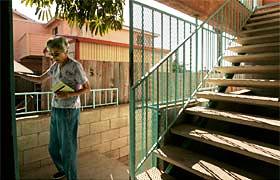|
Article Courtesy of The San Diego Union-Tribune
By Lori
Weisberg
San Diego County's mushrooming number of foreclosures is starting to hobble homeowners associations large and small as cash-strapped owners cease paying their monthly dues.
No homeowners association seems immune to the rise in delinquencies, from small condo associations in older neighborhoods to upscale high-rises in downtown San Diego. Even large, single-family-home communities, where monthly fees cover the cost of maintaining greenbelts, swimming pools and community centers, are feeling the pain. Especially vulnerable are smaller condo-conversion projects and developments in more affordable areas, such as eastern Chula Vista, where first-time homeowners stretched themselves financially to buy, using loans with low teaser rates that have since reset upward.
But associations have a tough time collecting once lenders swoop in and foreclose or owners declare bankruptcy. Although associations are allowed by law to place liens on the homes of defaulting homeowners, they have to get in line behind lenders to recover outstanding debt, said attorney Jeff French, whose firm Green, Bryant and French represent 150 associations in San Diego and Riverside counties. By then, it's probably too late, he added. “It puts a real financial strain on these associations, and they can't make their ends meet,” said French, who's seen his firm's collections business increase four-fold. “Suddenly you're left with a situation with a higher than normal default rate, and that leaves the homeowners association high and dry.”
“It's kind of devastating,” Epsten said. “Our only remedy once the lender forecloses is to pursue the matter in small-claims court, which is often futile because the owners are nearing bankruptcy and have pulled every cent they can out of every equity source.” CityFront Terrace, an upscale mid-rise downtown where monthly dues average $750, has had its share of delinquencies, although they represent 4 percent of the 320 condominiums, said Barbara Wilkinson, community manager. The unpaid fees total close to $50,000, which is still a small percentage of an annual budget of more than $2 million, she noted. “I'm more nervous than I ever had been,” Wilkinson said, “because it used to be that the owners would talk to the board about a payment plan. But now they're in a position where they can't do a payment plan, so it appears it's going south very quickly.” Typically, when homeowners start falling behind on their monthly fees, the association or its management company will send a reminder or a “pre-lien” letter informing them of the association's right to put a lien on their property. In some cases, payment plans are worked out; in other instances, liens will be filed. In much rarer occasions, the association will foreclose on the property but only after a year of missed payments or $1,800 in delinquencies. If a lender forecloses, it is supposed to start paying the monthly fees, but it has no obligation to cover the backlog of unpaid dues once the home or condo sells. The rising volume of unpaid dues is a problem that associations are facing statewide, said Karen Conlon, president and CEO of the California Association of Community Managers. She estimates that delinquent assessments have increased by at least 1,000 percent. “We are going to be seeing bankruptcies by the homeowners and cash-flow problems for the associations, so all the other homeowners will have to pick up the slack of the missing money,” Conlon said. That's especially troubling for a small condominium complex in Imperial Beach where two of the seven homeowners have defaulted on their monthly dues of $170, said resident Mark East, a former board president. “The building needs to be painted, and it still has the original roof, and our checking and savings accounts are down very low,” said East, who owns a two-bedroom unit with his mother, Pat White, the board's vice president. “The association has never been in the disarray it is now, and if we want to rent or sell these units, no way will that happen,” East said. “We're all stuck in a quagmire.” |
| NEWS PAGE | HOME | HOA ARTICLES |

